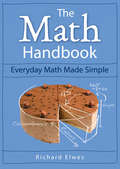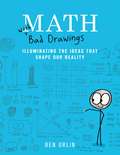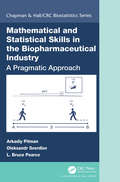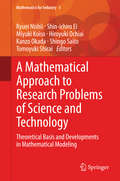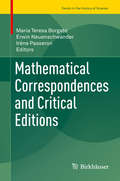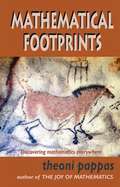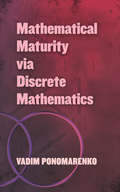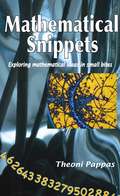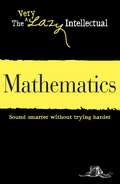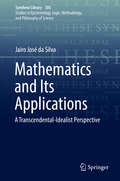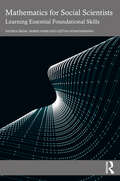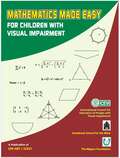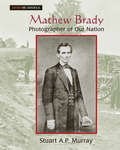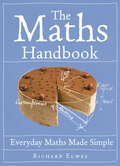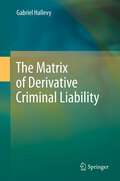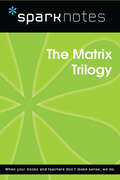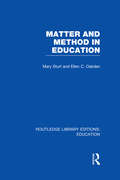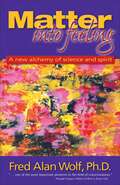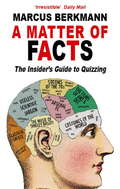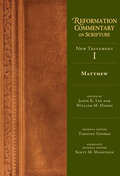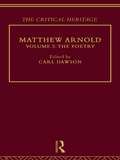- Table View
- List View
The Math Handbook
by Richard ElwesThis is the perfect introduction for those who have a lingering fear of math. If you think that math is difficult, confusing, dull or just plain scary, then The Math Handbook is your ideal companion. Covering all the basics including fractions, equations, primes, squares and square roots, geometry and fractals, Dr. Richard Elwes will lead you gently towards a greater understanding of this fascinating subject. Even apparently daunting concepts are explained simply, with the assistance of useful diagrams, and with a refreshing lack of jargon.So whether you're an adult or a student, whether you like Sudoku but hate doing sums, or whether you've always been daunted by numbers at work, school or in everyday life, you won't find a better way of overcoming your nervousness about numbers and learning to enjoy making the most of mathematics.
Math with Bad Drawings: Illuminating the Ideas That Shape Our Reality
by Ben OrlinA hilarious reeducation in mathematics-full of joy, jokes, and stick figures-that sheds light on the countless practical and wonderful ways that math structures and shapes our world. In Math With Bad Drawings, Ben Orlin reveals to us what math actually is; its myriad uses, its strange symbols, and the wild leaps of logic and faith that define the usually impenetrable work of the mathematician. Truth and knowledge come in multiple forms: colorful drawings, encouraging jokes, and the stories and insights of an empathetic teacher who believes that math should belong to everyone. Orlin shows us how to think like a mathematician by teaching us a brand-new game of tic-tac-toe, how to understand an economic crises by rolling a pair of dice, and the mathematical headache that ensues when attempting to build a spherical Death Star. Every discussion in the book is illustrated with Orlin's trademark "bad drawings," which convey his message and insights with perfect pitch and clarity. With 24 chapters covering topics from the electoral college to human genetics to the reasons not to trust statistics, Math with Bad Drawings is a life-changing book for the math-estranged and math-enamored alike.
Mathematical and Statistical Skills in the Biopharmaceutical Industry: A Pragmatic Approach (Chapman & Hall/CRC Biostatistics Series)
by Arkadiy PitmanMathematical and Statistical Skills in the Biopharmaceutical Industry: A Pragmatic Approach describes a philosophy of efficient problem solving showcased using examples pertinent to the biostatistics function in clinical drug development. It was written to share a quintessence of the authors’ experiences acquired during many years of relevant work in the biopharmaceutical industry. The book will be useful will be useful for biopharmaceutical industry statisticians at different seniority levels and for graduate students who consider a biostatistics-related career in this industry. Features: Describes a system of principles for pragmatic problem solving in clinical drug development. Discusses differences in the work of a biostatistician in small pharma and big pharma. Explains the importance/relevance of statistical programming and data management for biostatistics and necessity for integration on various levels. Describes some useful statistical background that can be capitalized upon in the drug development enterprise. Explains some hot topics and current trends in biostatistics in simple, non-technical terms. Discusses incompleteness of any system of standard operating procedures, rules and regulations. Provides a classification of scoring systems and proposes a novel approach for evaluation of the safety outcome for a completed randomized clinical trial. Presents applications of the problem solving philosophy in a highly problematic transfusion field where many investigational compounds have failed. Discusses realistic planning of open-ended projects.
A Mathematical Approach to Research Problems of Science and Technology: Theoretical Basis and Developments in Mathematical Modeling (Mathematics for Industry #5)
by Hiroyuki Ochiai Ryuei Nishii Shin-Ichiro Ei Miyuki Koiso Kanzo Okada Shingo Saito Tomoyuki ShiraiThis book deals with one of the most novel advances in mathematical modeling for applied scientific technology, including computer graphics, public-key encryption, data visualization, statistical data analysis, symbolic calculation, encryption, error correcting codes, and risk management. It also shows that mathematics can be used to solve problems from nature, e. g. , slime mold algorithms. One of the unique features of this book is that it shows readers how to use pure and applied mathematics, especially those mathematical theory/techniques developed in the twentieth century, and developing now, to solve applied problems in several fields of industry. Each chapter includes clues on how to use "mathematics" to solve concrete problems faced in industry as well as practical applications. The target audience is not limited to researchers working in applied mathematics and includes those in engineering, material sciences, economics, and life sciences.
Mathematical Correspondences and Critical Editions (Trends in the History of Science)
by Maria Teresa Borgato Erwin Neuenschwander Irène PasseronMathematical correspondence offers a rich heritage for the history of mathematics and science, as well as cultural history and other areas. It naturally covers a vast range of topics, and not only of a scientific nature; it includes letters between mathematicians, but also between mathematicians and politicians, publishers, and men or women of culture. Wallis, Leibniz, the Bernoullis, D'Alembert, Condorcet, Lagrange, Gauss, Hermite, Betti, Cremona, Poincaré and van der Waerden are undoubtedly authors of great interest and their letters are valuable documents, but the correspondence of less well-known authors, too, can often make an equally important contribution to our understanding of developments in the history of science. Mathematical correspondences also play an important role in the editions of collected works, contributing to the reconstruction of scientific biographies, as well as the genesis of scientific ideas, and in the correct dating and interpretation of scientific writings. This volume is based on the symposium “Mathematical Correspondences and Critical Editions,” held at the 6th International Conference of the ESHS in Lisbon, Portugal in 2014. In the context of the more than fifteen major and minor editions of mathematical correspondences and collected works presented in detail, the volume discusses issues such as • History and prospects of past and ongoing edition projects, • Critical aspects of past editions, • The complementary role of printed and digital editions, • Integral and partial editions of correspondence, • Reproduction techniques for manuscripts, images and formulae, and the editorial challenges and opportunities presented by digital technology.
Mathematical Footprints
by Theoni PappasMATHEMATICAL FOOTPRINTS takes a creative look at the role mathematics has played since prehistoric times, and will play in the future, and uncovers mathematics where you least expect to find it from its many uses in medicine, the sciences, and its appearance in art to its patterns in nature and its central role in the development of computers. Pappas presents mathematical ideas in a readable non-threatening manner.MATHEMATICAL FOOTPRINTS is another gem by the creator of THE MATHEMATICS CALENDAR and author of THE JOY OF MATHEMATICS."Pappas's books have been gold mines of mathematical entertainment...spreading inspirational and mathematical good cheer. " - Jon Scieszka, author of Math Curse
Mathematical Maturity via Discrete Mathematics (Dover Books on Mathematics)
by Vadim PonomarenkoDesigned for a one-semester course for undergraduate majors in math, computer science, and computer engineering, this text helps students take the crucial step from consuming mathematics to producing mathematics. Author Vadim Ponomarenko employs the general concept of discrete mathematics to introduce the basic knowledge of proof techniques and their uses.Like other beginning texts on methods of proof, this treatment offers definitions, theorems, and techniques. Unlike other books, it explains how to read, interpret, and use definitions, demonstrating not only general proof strategies — like proof of induction — but also the specific methods of thought for implementing these strategies. All techniques are built from scratch to provide an intellectually consistent whole. Each chapter contains several exercises, for which the author provides hints rather than solutions to encourage creative thinking.
Mathematical Snippets
by Theoni PappasFrom nutritional labels and box office statistics to terabytes and megapixels, the 21st century world is awash in numbers. How can the average Joe or Jane make sense of all that data? The key, Theoni Pappas argues, is math. In Mathematical Snippets, she draws readers into the fascinating world of math without overwhelming them with mind-numbing equations. Short, engaging sections on everything from golf to game theory introduce mathematical concepts and celebrate math's impact on daily life.
Mathematics: Sound smarter without trying harder (The Very Lazy Intellectual)
by Adams MediaDo have trouble figuring out a restaurant tip? Does the thought of algebra still give you nightmares? Fear not! The Very Lazy Intellectual: Mathematics introduces you to quantitative calculation and logical reasoning. Unlock the mysteries (or at least the basics) of algebra, calculus, geometry, and trigonometry!
Mathematics and Its Applications: A Transcendental-Idealist Perspective (Synthese Library #385)
by Jairo José da SilvaThis monograph offers a fresh perspective on the applicability of mathematics in science. It explores what mathematics must be so that its applications to the empirical world do not constitute a mystery. In the process, readers are presented with a new version of mathematical structuralism.The author details a philosophy of mathematics in which the problem of its applicability, particularly in physics, in all its forms can be explained and justified. Chapters cover: mathematics as a formal science, mathematical ontology: what does it mean to exist, mathematical structures: what are they and how do we know them, how different layers of mathematical structuring relate to each other and to perceptual structures, and how to use mathematics to find out how the world is.The book simultaneously develops along two lines, both inspired and enlightened by Edmund Husserl’s phenomenological philosophy. One line leads to the establishment of a particular version of mathematical structuralism, free of “naturalist” and empiricist bias. The other leads to a logical-epistemological explanation and justification of the applicability of mathematics carried out within a unique structuralist perspective. This second line points to the “unreasonable” effectiveness of mathematics in physics as a means of representation, a tool, and a source of not always logically justified but useful and effective heuristic strategies.
Mathematics Curriculum, Teacher Professionalism, and Supporting Policies in Korea and the United States: Summary of a Workshop
by Ana FerrerasOn July 15-17, 2012 the United States National Commission on Mathematics Instruction and Seoul National University held a joint Korea-U. S. workshop on Mathematics Teaching and Curriculum. The workshop was organized to address questions and issues related to math teaching and curriculum that were generated by each country, including the following: What are the main concerns in the development of the curriculum? What issues have been discussed or debated among curriculum developers, teachers, teacher educators, and scholars regarding the curriculum? How have textbooks been developed for the curriculum? How are curricular tasks designed and what criteria are used? What is the role of learning trajectories in the development of curriculum? This report summarizes the presentations and discussions at the workshop.
Mathematics for Social Scientists: Learning Essential Foundational Skills
by Shobha Bagai Amber Habib Geetha VenkataramanThis book helps readers bridge the gap between school-level mathematical skills and the quantitative and analytical skills required at the professional level. It presents basic mathematical concepts in an everyday context, enabling readers to pick up skills with ease.Mathematics for Social Scientists:• Focuses on building foundational skills in reasoning, data analysis and quantitative methods that are a requisite for progressing to higher levels;• Helps readers express mathematical ideas in the form of sets, analyse arguments and their validity mathematically, interpret and handle data, and understand the concept and use of probability;• Includes a dedicated chapter on symmetry, perspective and art to encourage readers to reason, model and objectively evaluate everyday situations.The volume will be useful to students of various disciplines in Social Sciences and Liberal Arts. It will also be an invaluable companion to practitioners of social sciences, humanities and life sciences, as well as schoolteachers at the middle and higher secondary level.
Mathematics Made Easy For The Children With Visual Impairment
by International Council for Education of People with Visual ImpairmentOverbrook is proud to release this publication with their colleagues at the International Council for Education of People with Visual Impairment (ICEVI) and hope you will find it of value in strengthening your ability to teach secondary level mathematics concepts to children with visual impairment.
Mathew Brady: Photographer of Our Nation
by Stuart A MurrayIn a spellbinding account of her two-year teaching stint and travels in China, Woronov provides, through numerous anecdotes, insight into the everyday life of the modern Chinese people. 20 photos.
The Maths Handbook: Everyday Maths Made Simple
by Richard ElwesThis is the perfect introduction for those who have a lingering fear of maths. If you think that maths is difficult, confusing, dull or just plain scary, then The Maths Handbook is your ideal companion. Covering all the basics including fractions, equations, primes, squares and square roots, geometry and fractals, Dr Richard Elwes will lead you gently towards a greater understanding of this fascinating subject. Even apparently daunting concepts are explained simply, with the assistance of useful diagrams, and with a refreshing lack of jargon.So whether you're an adult or a student, whether you like Sudoku but hate doing sums, or whether you've always been daunted by numbers at work, school or in everyday life, you won't find a better way of overcoming your nervousness about numbers and learning to enjoy making the most of mathematics.
The Maths Handbook: Everyday Maths Made Simple
by Richard ElwesThis is the perfect introduction for those who have a lingering fear of maths. If you think that maths is difficult, confusing, dull or just plain scary, then The Maths Handbook is your ideal companion. Covering all the basics including fractions, equations, primes, squares and square roots, geometry and fractals, Dr Richard Elwes will lead you gently towards a greater understanding of this fascinating subject. Even apparently daunting concepts are explained simply, with the assistance of useful diagrams, and with a refreshing lack of jargon.So whether you're an adult or a student, whether you like Sudoku but hate doing sums, or whether you've always been daunted by numbers at work, school or in everyday life, you won't find a better way of overcoming your nervousness about numbers and learning to enjoy making the most of mathematics.
The Matrix of Derivative Criminal Liability
by Gabriel HallevyDerivative criminal liability includes inchoate offenses (criminal attempt, conspiracy, preparatory offenses, etc.), complicity (joint perpetration, perpetration through another, incitement, solicitation, accessoryship, etc.), organized crime, natural and probable consequences liability, post-crime aid, enterprise liability, terrorism and terrorist infrastructure, and many more forms of criminal liability, clearly making it a major pillar of modern criminal law. Although derivative criminal liability affects countries worldwide, there is still no general legal theory that covers this issue. The objective of the present book is to develop a comprehensive, general, legally sophisticated, and at the same time practical theory of derivative criminal liability. The book emphasizes the practicality of the theory to enable courts, lawyers, legislators, attorneys, students, and academics to apply it in their daily professional occupations.
The Matrix Trilogy (SparkNotes Film Guide)
by SparkNotesThe Matrix Trilogy (SparkNotes Film Guide) Making the reading experience fun! SparkNotes Film Guides are one-stop guides to great works of film–masterpieces that are the foundations of filmmaking and film studies. Inside each guide you&’ll find thorough, insightful overviews of films from a variety of genres, styles, and time periods. Each film guide contains:Information about the director and the context in which the film was made Thoughtful analysis of major characters Details about themes, motifs, and symbols Explanations of the most important lines of dialogue In-depth discussions about what makes a film so remarkable SparkNotes Film Guides are an invaluable resource for students or anyone who wants to gain a deeper understanding of the great films they know and love.
Matter: Science Reference Book
by Chicago Science GroupA science, student reference book covering: What Is Matter? Solids Liquids Gases Density Matter Changes States Mixtures Physical and Chemical Changes Tools of Science
Matter and Method in Education (Routledge Library Editions: Education)
by Mary SturtThis volume discusses school practice and methods in the early twentieth century against their historical background. It covers the curriculum, time-tabling, lesson planning, exams and discipline. Each chapter ends with extensive notes and questions for discussion.
Matter Into Feeling: A New Alchemy of Science and Spirit
by Fred Alan WolfThe theoretical physicist and author of Mind into Matter explores the hidden power of feelings—and how we can harness them to improve our lives.In Matter into Feeling, Fred Alan wolf once again bridges the gap between spirituality and quantum physics. This time, Wolf takes us on an exciting journey toward understanding where our feelings come from and how we can work with them to create more abundant and joyful lives.In his follow-up to Mind into Matter, Dr. Wolf shares an enlightening new perspective on the conflicts and resistances we feel as physical beings—the everyday demands, addictions, successes, and failures we experience. Through this new understanding, readers learn that being “stuck” is only a phase—but one that we can only escape from once we understand the origin and role of human feeling.
A Matter Of Facts: The Insider's Guide To Quizzing
by Marcus BerkmannMarcus Berkmann is a competitive obsessive but where he was very bad at cricket (see RAIN MEN) he's a brilliantly knowledgeable nerd and a great success at pub quizzes. He's possibly the only man in Britain whom Nick Hornby is jealous of - because his team beat Hornby's in a pub quiz and went on to win the EVENING STANDARD knockout tournament.This hilarious book will do for quiz culture - from Mastermind to Fifteen to One to the quiz in your local - what LOST IN MUSIC did for bad rock bands. Thousands of people take part in quizzes every week answering questions such as who won the League Cup in 1972 (Stoke City beat Chelsea 3-2) and which of Henry VIII's wives was both a widow and a virgin when she married him (Catherine of Aragon)?Funny, informative, original: this book has all the answers - including the one to question six.
A Matter Of Facts: The Insider's Guide To Quizzing
by Marcus BerkmannMarcus Berkmann is a competitive obsessive but where he was very bad at cricket (see RAIN MEN) he's a brilliantly knowledgeable nerd and a great success at pub quizzes. He's possibly the only man in Britain whom Nick Hornby is jealous of - because his team beat Hornby's in a pub quiz and went on to win the EVENING STANDARD knockout tournament.This hilarious book will do for quiz culture - from Mastermind to Fifteen to One to the quiz in your local - what LOST IN MUSIC did for bad rock bands. Thousands of people take part in quizzes every week answering questions such as who won the League Cup in 1972 (Stoke City beat Chelsea 3-2) and which of Henry VIII's wives was both a widow and a virgin when she married him (Catherine of Aragon)?Funny, informative, original: this book has all the answers - including the one to question six.
Matthew (Reformation Commentary on Scripture #Nt Volume 1)
by William M. Marsh Jason K. Lee, William M. Marsh Jason K. Lee"As they were eating, Jesus took bread, and after blessing it broke it and gave it to the disciples, and said, 'Take, eat; this is my body.'" How should one interpret these words of Jesus? The sixteenth-century Reformers turned to Scripture to find the truth of God's Word, but that doesn't mean they always agreed on how to interpret it. For example, when approaching this passage from Matthew's gospel, Martin Luther read it literally, for "as he says in his own words, it is his body and his blood," but Thomas Cranmer argued that "there must be some figure or mystery in this speech." In this Reformation Commentary on Scripture volume, scholars Jason K. Lee and William Marsh guide readers through a wealth of early modern commentary on the book of Matthew. Readers will hear from familiar voices and discover lesser-known figures from a diversity of theological traditions, including Lutherans, Reformed, Radicals, Anglicans and Roman Catholics. Drawing upon a variety of resources—including commentaries, sermons, treatises, and confessions—much of which appears here for the first time in English, this volume provides resources for contemporary preachers, enables scholars to better understand the depth and breadth of Reformation commentary, and seeks to encourage all those who desire to read the words of Scripture faithfully.
Matthew Arnold: The Critical Heritage Volume 2 The Poetry (Critical Heritage Ser.)
by Carl DawsonFirst published in 1995. Routledge is an imprint of Taylor & Francis, an informa company.
